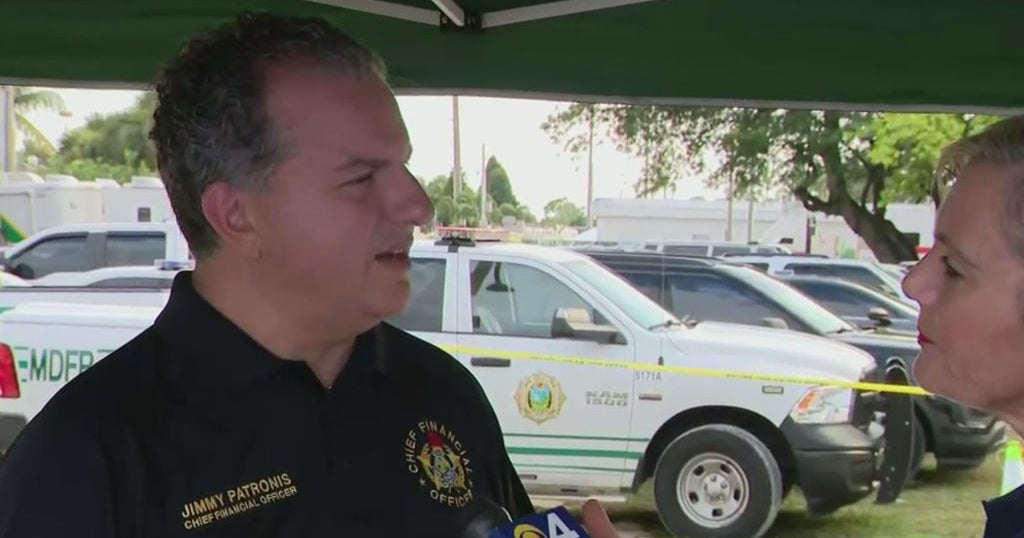Scott Calls For Congressional Action On Zika Funding
Follow CBSMIAMI.COM: Facebook | Twitter
TALLAHASSEE (CBSMiami/NSF) – With 70 confirmed cases resulting from Florida mosquitoes carrying the Zika virus, Gov. Rick Scott traveled to Washington, D.C., on Tuesday to implore Congress to break a deadlock on federal funding to combat the disease, which can cause severe birth defects.
"The Zika virus is now mosquito-borne in our state. Time is up for politics and political debates about a major federal effort to stop this disease," Scott said after a meeting with U.S. Sen. Marco Rubio, R-Fla.
Scott also had meetings scheduled with U.S. Rep. Ted Yoho, R-Fla., and U.S. House Speaker Paul Ryan, R-Wisc., on Tuesday. He is scheduled to meet with more congressional members on Wednesday.
Scott, who has authorized $26 million in emergency state funding for Zika, is spending two days in the nation's capital as Congress appears to be heading closer to including Zika funding in a stopgap federal spending bill.
Scott said the federal government "has managed to get its hands into too many things," while increasing the federal debt, "and yet they can't agree on spending money to stomp out a serious disease."
"It's unacceptable. It's exactly why the entire country is fed up with Washington and the federal government," Scott said in a statement. "This is not a partisan issue. Mosquitoes don't care about party affiliation."
Zika 101: Prevent Spread By Protecting Yourself
Scott's trip came as the Florida Department of Health on Tuesday reported a total of 799 Zika cases in Florida, including six new locally-acquired cases and 13 new travel-related cases. Some 86 cases involve pregnant women, who could face the possibility of their children being born with birth defects like microcephaly.
Congress has remained stalled on President Barack Obama's request for $1.9 billion in Zika funding since the spring, even as the federal Centers for Disease Control and Prevention recently reported it was running out of money for efforts to thwart the disease, including the development of a vaccine.
In a Senate floor speech on Tuesday, Rubio said he was encouraged by comments from Senate Majority Leader Mitch McConnell, R-Ky., that legislative leaders were working on a bill to extend federal spending through December that would include $1.1 billion in Zika funding. The measure was also expected to eliminate controversial policy provisions from the House that sought to cut off funding for some Planned Parenthood clinics in Puerto Rico.
Rubio said the Zika crisis was so critical, he was willing to drop his normal opposition to the temporary spending bills, known as continuing resolutions.
"At this point, I just really believe that we need to get Zika funding approved and moving. We need to make sure that the fight against Zika doesn't run out of money before the end of this month," said Rubio, who had supported Obama's original $1.9 billion request. "That's, for me, the most urgent priority."
A bipartisan group of Florida congressional members also held a press conference on Tuesday to call for the passage of a "clean" $1.1 billion Zika program, without the Planned Parenthood provisions.
"It is time to act. The politics of Zika have gone on far too long and people are scared," said U.S. Rep. David Jolly, R-Fla. "Only a clean bill will get the votes necessary to get this done and it is time Congress accept this reality and get a Zika package to the president's desk."
Jolly was joined by two other Republicans House members, Curt Clawson and Carlos Curbelo, and six Democrats, including U.S. Sen. Bill Nelson and House members Debbie Wasserman Schultz, Alan Grayson, Patrick Murphy, Frederica Wilson and Gwen Graham.
"I'm proud to see so many members of Florida's congressional delegation put politics aside to unite behind what's best for our state," Graham said. "Now it's time for the entire Congress to follow our lead."
Yet Tuesday was not free from partisan politics, as Scott went out of his way to criticize Nelson, whom the Republican governor may challenge in 2018, for voting against a $1.1 billion Zika bill last week.
"He turned his back on $1.1 billion to fight Zika because of politics," Scott said.
Nelson said he opposed the measure because it included the "highly partisan" provisions from the House. He noted he had joined an earlier bipartisan vote in the Senate in favor of $1.1 billion in Zika funding without the additional provisions.
"The virus is not a political opportunity," Nelson said in a floor speech earlier this week. "It's a public health emergency. To stop the spread of the virus, we are going to have to do what we did months ago: come together in a bipartisan fashion."
Earlier Tuesday, Republican and Democratic Senate leaders talked to reporters about the progress on the temporary spending bill and Zika funding.
McConnell, the Republican leader, was noncommittal, saying discussions were continuing on the legislation.
Sen. Harry Reid, the Democratic leader, said it was the Planned Parenthood provisions that stalled the bill last week and he has yet to see any specifics on the latest proposal.
"We don't have anything to look at right now," he said.
The News Service of Florida's Lloyd Dunkelberger contributed to this report.
Click here for more information on the Zika virus or here for more Zika-related stories.



